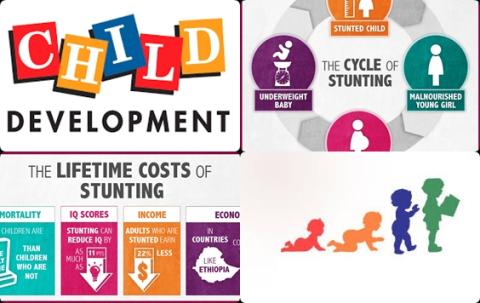
Objectives:
Stunting (length-for-age z score -2) before 2 years of age has shown associations with poor child developmental indicators, but information at the population level is scarce in South Asia, the region with the highest burden of stunting. Therefore, this review article has been conducted.
Does undernutrition (i.e., stunting [HAZ -2], wasting [WHZ -2] and underweight [WAZ -2]) associate with poor learning/cognition and social-emotional development among children 36-59 months of age in South Asia?
Study design:
This review article included data from Multiple Indicator Cluster Surveys in Bangladesh (n = 8,659), Bhutan (n = 2,038), Nepal (n = 2,253), and Pakistan (Punjab n = 11,369 and Sindh n = 6,718).
Children were considered developmentally "on-track" in learning/cognition or social-emotional domains if they met specific early child development criteria.
Meta-analysis was conducted to examine regional associations, adjusting for socio-economic status, early childhood education and quality of care.
Results and conclusions:
The investigators found in pooled analysis, that on-track learning/cognition development was positively associated with HAZ [OR = 1.17, 95% CI =1.07 to 1.27] and WAZ [OR = 1.18, 95% CI = 1.07 to 1.31].
The investigators found in pooled analysis, that on-track learning/cognition development significantly reduced risk of stunting with 28% [OR = 0.72, 95% CI = 0.60 to 0.86].
Significantly means that there is an association with a 95% confidence.
The investigators found in pooled analysis, that on-track learning/cognition development significantly reduced risk of underweight with 25% [OR = 0.75, 95% CI = 0.66 to 0.86].
The investigators found in pooled analysis, that on-track learning/cognition development was not associated with WHZ or wasting.
The investigators found in pooled analysis on-track development of social-emotional domain was not associated with any z scores or undernutrition indicators.
The investigators found that across several countries of South Asia, stunted children were less likely to be developmentally "on track" for learning/cognition.
The investigators concluded that interventions that prevent stunting have benefit effects on child development, leading to significant individual and societal gains given the large burden of child stunting in regions like South Asia.
Original title:
Association between stunting and early childhood development among children aged 36-59 months in South Asia by Kang Y, Aguayo VM, […], West KP Jr.
Link:
https://www.ncbi.nlm.nih.gov/pubmed/30499257
Additional information of El Mondo:
Find more information/studies on food fortification/malnutrition right here.